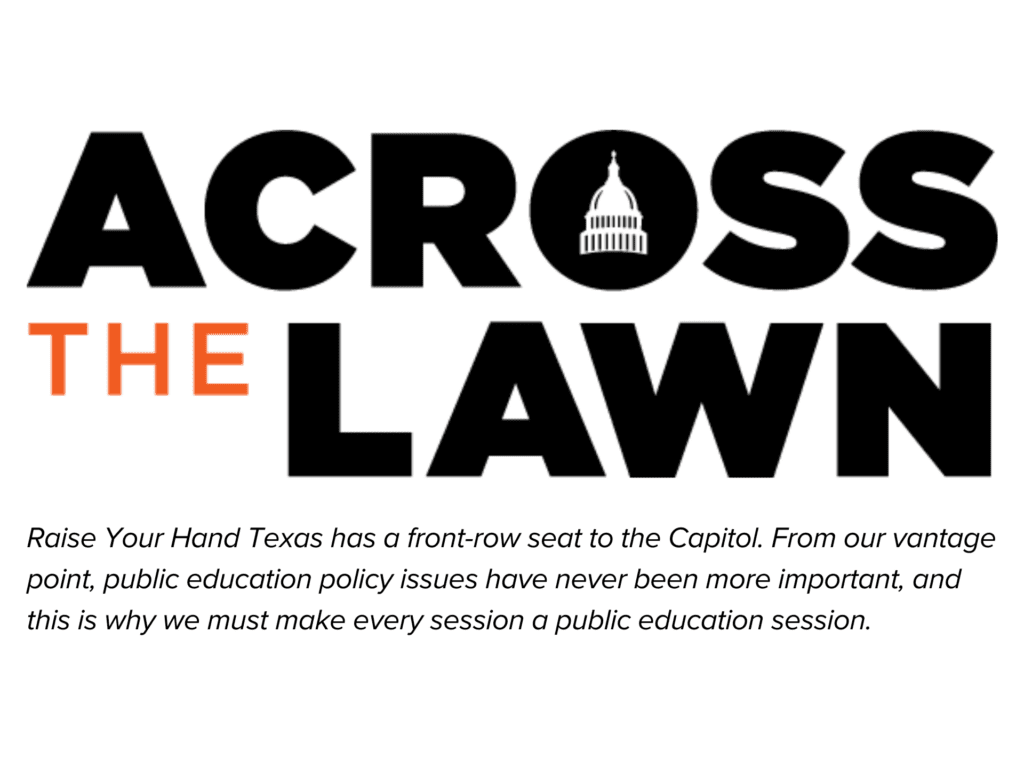
categories
Across the Lawn – August 8, 2025

August 08, 2025

Listen to the latest Intersect Ed Podcast episode
In our latest episode of Intersect Ed we discuss what the special session item “eliminating the STAAR test” could mean for Texas, along with the differences between criterion-referenced tests and nationally norm-referenced tests. Take a listen to our Q&A with Host Morgan Smith and Raise Your Hand Texas’ Dean of Advocacy Amy Dodson.
1. Identical Assessment and Accountability Bills Filed in House and Senate
Identical bills filed by Rep. Brad Buckley (House Bill 8) and Sen. Paul Bettencourt (Senate Bill 8) on Monday proposed a major redesign of Texas’ public school assessment and accountability systems. Here are the key takeaways:
- Requires Beginning of the Year (BOY), Middle of the Year (MOY), and End of the Year EOY) assessments in reading, language arts, math, science, and social studies
- Allows districts to use TEA-approved vendor BOY and MOY assessments; EOY remains TEA-designed
- Shortens test length and mandates faster turnaround for student results
- Requires teacher review panel approval for new test items
- Establishes a timeline for TEA to develop a through-year growth measure by 2032–33
- Allows optional reporting of student engagement and workforce development indicators (such as extracurricular participation, prekindergarten enrollment, and advanced coursework); indicators appear on public dashboards but do not count toward A through F ratings
- Creates a local accountability grant program to fund at least one district per education service center region to develop local indicators that may be submitted for commissioner approval and incorporated into the ratings systemReplaces STAAR beginning in the 2027–28 school year with a new instructionally supportive assessment program
2. Senate Education K-16 Passes Senate Bill 8 by Sen. Bettencourt
On Wednesday, August 6, the Senate Committee on Education K- 16 heard invited and public testimony on Senate Bill 8 (SB 8) by Sen. Paul Bettencourt. Commissioner Mike Morath discussed the overhaul of Texas’ assessment and accountability systems, reinforcing that these tests are designed to give teachers and families faster, more actionable data to guide instruction and identify student needs in real time.
Morath states the bill maintains an end-of-year criterion-referenced test tied to the TEKS and adds a norm-referenced reporting layer to help families understand how their child compares to other students. He stated the bill also codifies a regular five-year refresh of the A–F accountability system and establishes rules for annual release of ratings, clear modeling of any proposed changes, and strengthened alignment between college and career indicators.
The discussion described SB 8 as a significant shift in assessment and accountability, with several witnesses citing Houston ISD’s recent academic gains as evidence that strong systems, paired with instructional support, can drive improvement.
Commissioner Morath emphasized the importance of field testing and teacher review of test items and noted the new assessments are expected to reduce unnecessary test prep and restore tens of millions of instructional hours across the state.
3. How the Quorum Break Affects Public Education Policy
With less than two weeks remaining in the first called special session, the Texas House will likely not move forward with floor votes on any legislation, including education bills, after more than 50 Democratic lawmakers left the state in response to a proposed redistricting plan.
While committees may continue to hear public testimony and conduct other business, the full House cannot take up pending legislation until a quorum is reestablished. The House has not scheduled a hearing for its assessment and accountability bill, House Bill 8 by Rep. Buckley.
4. TEA Issues Statewide Policy Requirement on Student Cell Phone Use
The Texas Education Agency has released guidance requiring all school districts and charter schools to adopt a formal policy restricting student use of personal communication devices during the school day. This includes cell phones, tablets, smartwatches, and any device capable of digital or telecommunication, unless the device was issued by the school.
Districts have two options for compliance: ban students from bringing devices onto campus or designate a secure method for storing them throughout the day. Policies must include disciplinary measures for violations and allow for confiscation. Districts can also dispose of unclaimed devices after 90 days with proper notice to families.
Importantly, the policy must include exceptions for students with documented needs, such as IEPs, Section 504 plans, physician directives, or safety-related requirements.
Each school system must adopt and implement its policy no later than September 18, 2025.


